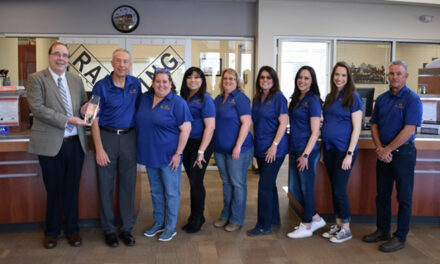With the end of the school year in sight, a local educator decided to put together a first-of-its kind event to help students with disabilities make the transition to their next phase of life.
Paul Howard, the special education director at School of Dreams Academy, coordinated a recent workshop to share information with students and parents about how the New Mexico Division of Vocational Rehabilitation can help students join the workforce or go on to secondary education.
The Division of Vocational Rehabilitation works with students, families, schools and various agencies and organizations to provide services to youth as young as 14 — the youngest a person can be to work in New Mexico with parental permission — up to adults of any age who want to work.
The youth DVR must have a diagnosed disability and an individualized education plan through their school to receive services. Adults also need to have a disability diagnosis.
April Baca, the supervising vocational rehabilitation counselor for DVR Area 7, which covers Valencia County, said the division can help students with school-to-work transition, as well as training programs that can lead to work down the road.
“We do job exploration counseling, where we work one-on-one with students to determine their interests, abilities and what kind of experience the need,” Baca told the workshop attendees last month. “Do you want to be a welder? Do you need training? Course work? What does the job entail? How much money can you make? Is there a market for the skill?”
DVR can offer some financial assistance, providing stipends to students who want to get work experience through volunteering or unpaid internships and apprenticeships.
“DVR can offer stipends to get experience on your resume,” Baca said. “That’s the No. 1 thing employers look for.”
For post secondary education, DVR will consider the household income and potentially cover gaps in student aid.
“We typically don’t work with out-of-state programs unless it’s not offered in state,” she said. “We can pay for tuition, fees, certifications, supplies, some transportation. We can even help with the purchase of laptops now.”
The division also helps students learn self advocacy, Baca said, since for most of their educational experience they’ve been guided by teachers, IEPs and parents.
“When you go to college, you don’t have IEPs, but you do have accommodations,” she said. “You have to advocate for yourself; tell everyone what you need to be successful.”
The program also provides work-place readiness training, assisting people with disabilities with resumes, building interview and social skills, communication skills, dressing for work, learning how to make change and a wide array of office skills.
DVR services are available throughout the state, Baca said, so if a client moves, they will be connected to the nearest local office.
“Unfortunately, DVR doesn’t go to other states, but every state offers similar services,” she said.
To begin the process of connecting with DVR resources, a student needs to complete a DVR client referral, which can be found on the DVR website. Information that needs to be supplied incudes name, address, Social Security number and disability diagnosis, then the student will be assigned to the closest DVR office.
“They will request medical records. Your IEP counts as medical records and can be used to qualify for eligibility. Everyone needs a disability diagnosis,” she said.
Baca emphasized that while the workshop focused on DVR’s services for students and their transition after graduation, the division works with any disabled person of any age with a diagnosis.
“We recently helped someone in their 70s get hearing aids because they wanted to keep working part time,” she said.
Sarah Clawson, the University of New Mexico-Valencia campus equal access coordinator, joined the workshop and spoke about how accommodations for students were provided at the secondary level.
“Accommodations follow a student but their IEP and goals do not,” Clawson said. “The college is responsible to check its programs and try to improve them. They designate an equal access coordinator like me. My responsibility is to make sure we sit with students and apply the accommodations.”
Students are responsible to meet the requirements of a university, with or without accommodations, she said.
“For instance, if you want to attend a university or college, you have to take a placement test. Some of you might have taken the ACT or SAT,” Clawson explained.
While students have to be able to pass an entrance exam, they can be provided accommodations while testing, but that requires a separate application through the equal access coordinator.
“Students have to document their disability. We need a diagnosed disability from a licensed professional or a diagnostic report. A letter from a doctor works fine,” she said. “If you have a learning disability and the diagnostic information was done in K-12, it’s easier to get while you’re in the system. Get it now.”
Clawson recommends to those preparing IEPs to include the disability diagnosis in that document to help student as they move into secondary education. Students also have to be willing to disclose their disability to get accommodations, which will be kept confidential.
“I realize there’s a stigma surrounding disability. I see students a lot who have been here a semester or two and they are digging a hole with financial aid, they are lost and stressed out. If you come to me when you’re applying, it could make a huge difference,” she said. “Students are not pre-identified. The only way we’ll know is if you come and tell me.
“I’m not going to give you a hard time. We are going to have a chat and do the best we can to make your educational experience successful. This is the time where the shift of focus goes from the school to you. It’s not that the school doesn’t have responsibilities, but (information is) starting to come from the student.”
For more information about the Division of Vocational Rehabilitation’s programs and services, visit dvr.state.nm.us.
The Los Lunas DVR office is at 445 Camino Del Rey SW, Suite D. They can be reached at 505-864-1617 or toll-free at 888-901-7902.
Julia M. Dendinger began working at the VCNB in 2006. She covers Valencia County government, Belen Consolidated Schools and the village of Bosque Farms. She is a member of the Society of Professional Journalists Rio Grande chapter’s board of directors.

















